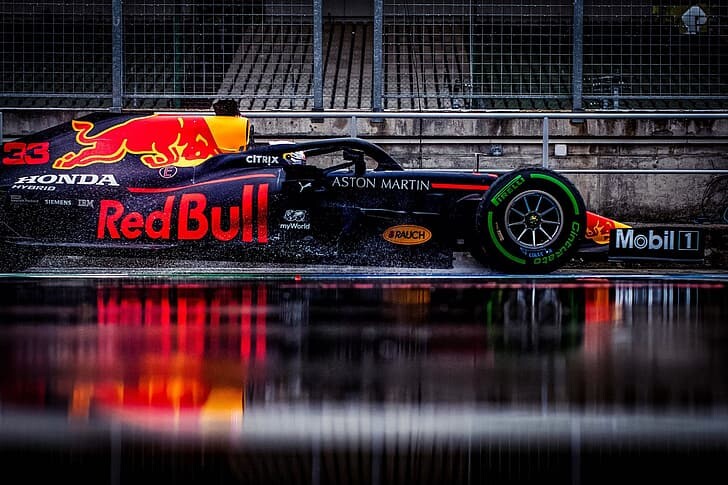Ryan Boulanger, Reporter
@RyanBCourant
The last two Sundays have been quite busy for me, causing me to unfortunately miss both races, leaving me to resort to F1 Twitter and YouTube to catch up on the action. For those who don’t know me, I’m a Ferrari fan who feels pain watching Max win week after week in a dominant fashion. In fact, this weekend I was visiting relatives who had sunday night football on the TV, and when I flipped the channel in a desperate attempt to watch the final few laps of the race, the first thing I saw was Max hoisting himself out of his sleek Red Bull car, holding his fists in the air with triumph.
As I scrolled through Twitter, more underlying facts started to present themselves to me. Before any Red Bull fans click off this article in disgust, comparing Verstappen to Schumacher or pointing out Hamilton’s dominance throughout the last decade… hear me out. In this post I’ll give you 2 valid instances when the FIA has leaned in Red Bull’s way, and how F1 needs to hold teams accountable for their actions.
#1- Budget Cap Mania
If these words don’t trigger any immediate reaction, make sure to read my last blog post where I explained what’s going on with Red Bull and F1’s budget cap. To continue the story, Red Bull was eventually found last week to have gone over 2021’s budget cap by about 1.6% – this is a little less than what I initially thought – and faces a seven million dollar fine, along with a 10% reduction in ATA (Aerodynamic Testing Allowance).
This sounds like a lot, sure, but for a team to blatantly ignore regulations that constitute the very idea of F1 — keeping teams from spending excess money in order to have a competitive advantage over smaller teams – destroys the reputation of F1 and sets a negative precedent that other top teams such as Ferrari (yes, they’re not perfect either) or Mercedes could follow.
Several other midfield teams agree: it’s good that Red Bull was at least reprimanded for exceeding the budget cap, however the penalties they face are not harsh enough. McLaren team principal Andreas Seidl told Motorsport.com, “if you look at the penalty, it just doesn’t fit the breach.”
Excusing a budget cap breach with a minor fine and a small reduction in testing capacity simply won’t fly with other teams. Several other teams, namely Ferrari, agree that the reduction in ATA won’t affect Red Bull as much as it would affect other teams due to their already stellar aerodynamic engineering. Some analysts worry that breaching the budget cap could become similar to taking a grid penalty for replacing an engine mid-season. This is worrisome to smaller teams – who’s funding and title sponsors would restrict their ability to take such financial penalties – while larger teams such as Red Bull, Mercedes, and Ferrari could take said penalties with very little repercussion.
#2 In Race Penalties
Penalties exist for a reason: to reprimand drivers for breaking the rules and hopefully take away whatever competitive advantage they had. I’ll be fair and say that the penalty that cost Leclerc his fighting chance in the WDC at Suzuka for cutting a corner was completely fair and well-deserved, however there have been several instances this season where the FIA has handed out penalties specifically pertaining to Red Bull AFTER the race was over. You might stop as you are reading this and say, hey Ryan, that makes zero sense, or doesn’t that argue the opposite of your point? Hear me out.
A great example of this was Sergio Perez’s win in Singapore. Perez, under a safety car, mistakenly led the field less than ten car lengths behind the safety car, a move that warranted a penalty, given after the race was over. I watched Sky Sports for about an hour after the race had ended to find out whether Perez had kept his win, and 3 hours later the 5 second penalty was given.
This is the correct penalty to give in this instance, but here’s my problem with it: Leclerc finished about 7 seconds behind Perez, allowing Perez to narrowly keep his win. I’m not saying that if the FIA had given the penalty during the race Leclerc would have gotten inside the 5 second window he needed to beat him, but he at least would have started pushing his car harder. Keep in mind that the actual infraction happened around the middle of the race, leaving the FIA plenty of time to make a decision, instead they decided to wait until the end of the race to “hear from the drivers and the teams”.
I’m not pushing any conspiracy theories here. All things said and done, I think Red Bull is a great team with exceptional ability on both the driving and engineering sides of F1. I think it is simply important to note these 2 instances, and keep in mind the money and politics that are traded behind the scenes in F1.
Check out my Suzuka race review here:
If you’re new to F1 take a look at this excellent explanation of the sport:




